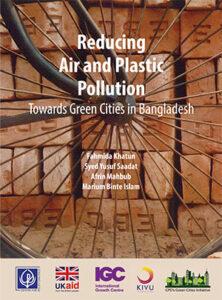 Air and plastic pollution pose a significant threat to Bangladesh.
Air and plastic pollution pose a significant threat to Bangladesh.
Bangladesh’s cities lead the world in levels of air and plastic pollution. Bangladesh was determined to have the most polluted air in the world in 2020 and 2021 according to IQAir, while Dhaka had the worst air quality of any city in 2021.
This poses a significant challenge for the country, in terms of both health outcomes and potential economic losses. Health problems associated with air pollution are responsible for reducing life expectancy in Bangladesh by 6.8 years on average. The symptoms of this burden of disease have a significant economic cost too, through lost productivity and reduced academic attainment.
Plastic pollution is an equally concerning issue as it affects the well-being of Bangladesh. The proliferating use of plastic products and the inadequate waste management system are leading to substantial environmental damage. This involves the obstruction of drainage systems, causing massive urban flooding during heavy rainfall in Bangladesh and endangerment of the marine ecosystems. Additionally, incineration of plastic waste is hazardous for human health and micro and nanoparticles of plastic may also enter the food chain through contaminated fish causing further health concerns for individuals.
As one of the countries most exposed to the impacts of climate change, reducing pollution should be a priority for Bangladesh.
The CPD’s Green Cities Initiative was set up to better understand the drivers of air and plastic pollution in Bangladesh’s cities and develop workable policy solutions to air and plastic pollution. Since its establishment, the Green Cities Initiative has brought together scientific evidence and economic analysis, producing a series of reports, policy briefs and events that have improved understanding of the problem among policymakers, journalists and members of the academic community. This report details much of the work so far to build up a useful body of evidence for those developing policy in Bangladesh.
In this final report, the Green Cities Initiative adds significantly to its study by presenting an analysis of the public attitudes and behaviours associated with air and plastic pollution, complementing the existing work focused on structural and systemic factors.
The Green Cities Initiative undertook a survey of 500 households in Dhaka city to understand the perceptions of the problem of pollution, and attitudes towards different policy solutions. This survey explored residents’ perceptions of the scale of air and plastic pollution, their understanding of the causes and impacts of pollution and their willingness to change their own behaviour or support policies with the aim of reducing pollution in the city.
Authors: Fahmida Khatun, Syed Yusuf Saadat, Afrin Mahbub and Marium Binte Islam
Publication Period: September 2023

